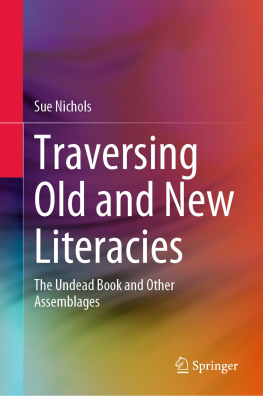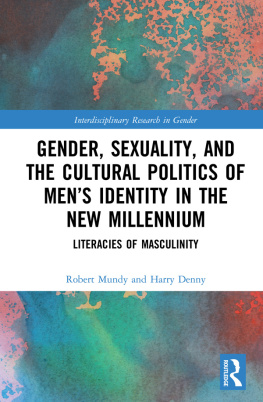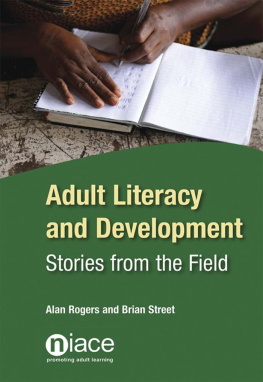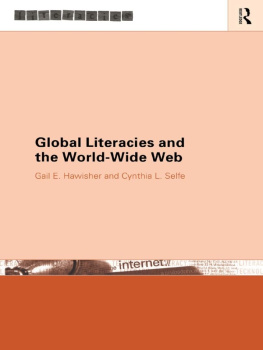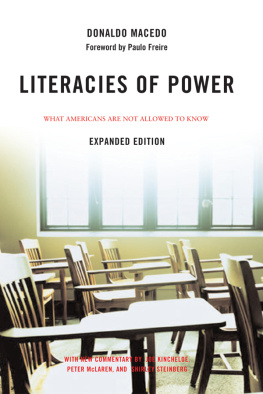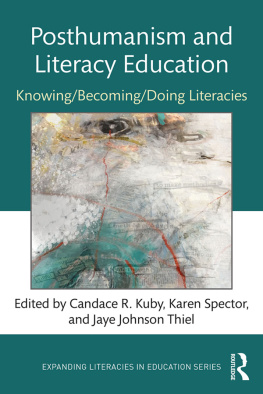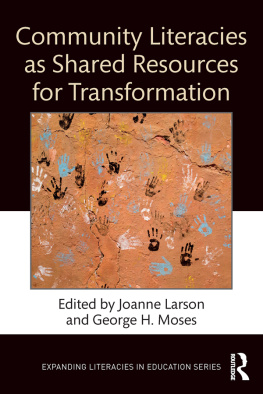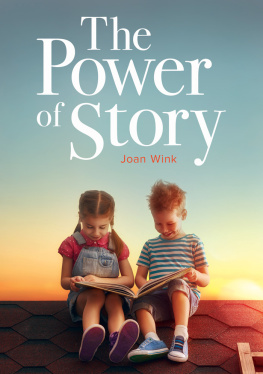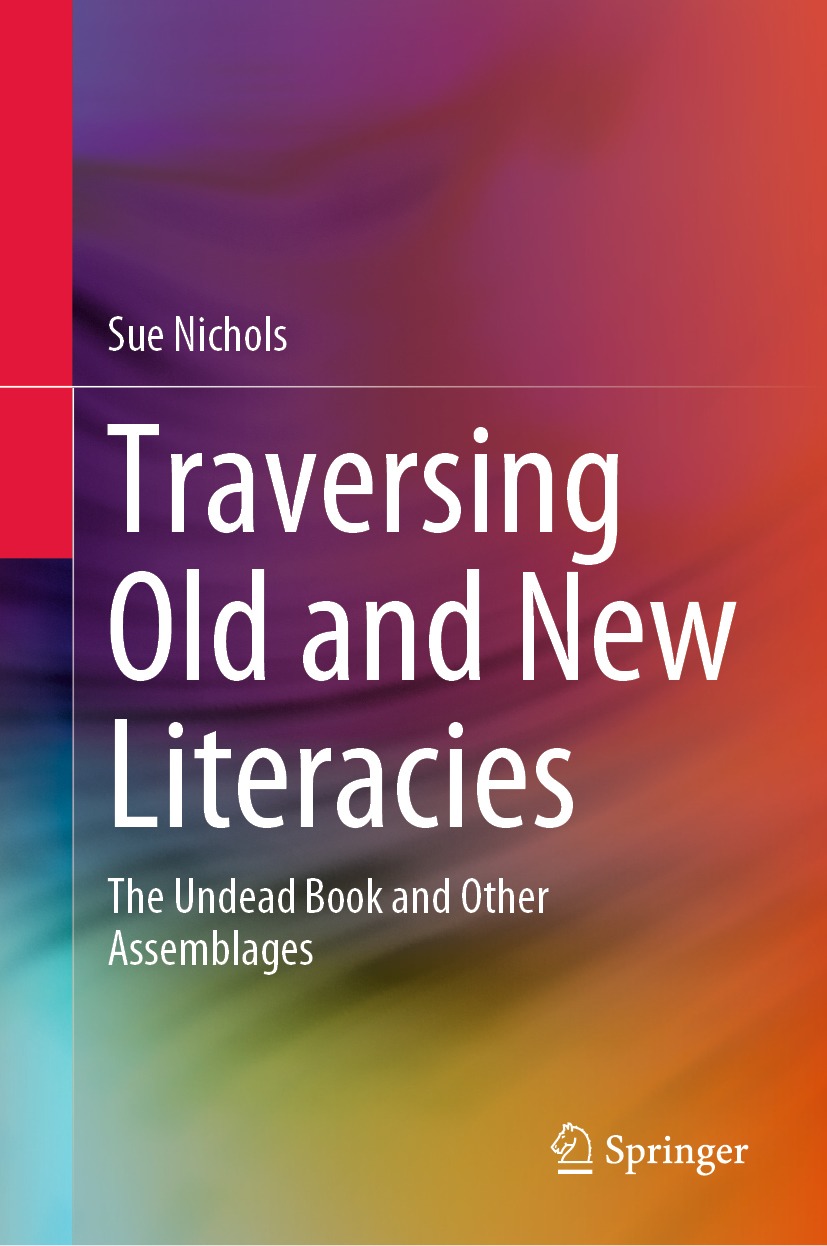Sue Nichols
Traversing Old and New Literacies
The Undead Book and Other Assemblages

The Springer logo.
Sue Nichols
Education Futures, University of South Australia, Magill, SA, Australia
ISBN 978-981-19-7973-6 e-ISBN 978-981-19-7974-3
https://doi.org/10.1007/978-981-19-7974-3
Springer Nature Singapore Pte Ltd. 2022
This work is subject to copyright. All rights are reserved by the Publisher, whether the whole or part of the material is concerned, specifically the rights of translation, reprinting, reuse of illustrations, recitation, broadcasting, reproduction on microfilms or in any other physical way, and transmission or information storage and retrieval, electronic adaptation, computer software, or by similar or dissimilar methodology now known or hereafter developed.
The use of general descriptive names, registered names, trademarks, service marks, etc. in this publication does not imply, even in the absence of a specific statement, that such names are exempt from the relevant protective laws and regulations and therefore free for general use.
The publisher, the authors, and the editors are safe to assume that the advice and information in this book are believed to be true and accurate at the date of publication. Neither the publisher nor the authors or the editors give a warranty, expressed or implied, with respect to the material contained herein or for any errors or omissions that may have been made. The publisher remains neutral with regard to jurisdictional claims in published maps and institutional affiliations.
This Springer imprint is published by the registered company Springer Nature Singapore Pte Ltd.
The registered company address is: 152 Beach Road, #21-01/04 Gateway East, Singapore 189721, Singapore
To the historians, custodians, and memory-makersand to one especially.
Preface: What was New
I didnt know at first that I had become a migrant. Rather, there was just a leaving and then a journeying. Staring up at the immensity of an ocean liner, it was beyond belief that I would somehow be joining the tiny people who were waving from the top of its cliff-like bulk. I had never seen anything so big. From the moment we closed the door on our home, everything had been strange. But thisthis was a different universe.
The liminal time of this long journey turned out to be a kind of preparation for all the strangeness to come. Once we had arrived and settled in our new home, a place with only earth for a garden, it was time to start school. It wasnt what I had imagined. We marched every day into a space called the quadrangle, saluted the flag, and sang a song with mystifying lyrics: There is a land where summer skies are gleaming with a thousand eyes. At least thats what I heard.
I learned there were books called readers and that I would be expected to concentrate on them. These readers were so short, it was hard to imagine spending time with them. They had no discernible plot, and only a few characters who spoke in an odd manner, unlike either book characters or real people. At school, rather than read to us, teachers would listen to us read, one at a time, and we all had to listen to our peers stumbling along.
At school, the literacy practices in which I participated would undoubtedly be categorised as old from a contemporary viewpoint. We sat in rows facing the blackboard, with the teacher at the front, just like the black and white photographs that currently are used to illustrate the outdated factory model of schooling (see Chapter ).
But this experience was new and strange to me. It wasnt that decoding print was an unfamiliar practiceI could already do that. But rather, what the teacher referred to as reading did not connect with my prior experience of reading. What she called a book did not look anything like the books at home. And what she called a story was so unlike the stories I had listened to.
At home, my father would read to us from his collection of books or spin us a tale from his imagination or memory. My dads collection of books was well travelled. Not only had they made the journey to Australia but had accompanied him during his previous life as a sailor. These books had complicated plots, many characters, and dramatic subject matter that sometimes lived on in my dreams. With authors like Dickens, Stephenson, and Shakespeare, they would no doubt be considered classics. But to me they were just the books dad would read to us. Until I encountered school readers, these were the only books I knew.
Dad didnt ask to hear me read. After all, he had read those books many times. My brother and I were the ones hearing them for the first time and it was self-evident that our father should be the reader. In fact, before school, that is what I thought a reader wassomeone who read. Not a short unsatisfying thing that looked more like a leaflet than a real book.
Recovering the strangeness of a childs early introduction to school literacies raises questions about possible meanings of old and new literacies and from whose perspective literacy histories are told. Such questions have also challenged my practice as a literacy researcher, teacher, and teacher educator. They set me on the course to writing this book.
Acknowledgement of Country
This book was written on the countries of the Kaurna, Turrbal, and Ngadjuri peoples. I acknowledge the continuing and living connection with their country, language, and culture of these peoples.
Acknowledgements
I am grateful to the University of South Australia for granting a sabbatical so I could work on this book. To my colleagues in the English curriculum group, thank you for inspiring me with your dedication, curiosity, and passion for ideas. Thank you to those who read drafts of chapters; you always gave me hope to go on.
Abbreviations
AC
Assassins Creed
ANT
Actor-Network Theory
BIH
Books Into Homes
COVID
Coronavirus
DPLA
Digital Public Library of America
ICT
Information and Communications Technology
LN
Language Nutrition
NCFL
National Center for Family Literacy
NLG
New London Group
ROR
Reach Out and Read
TMW
Thirty Million Words
USB
Universal Serial Bus
Contents
List of Figures
Springer Nature Singapore Pte Ltd. 2022
S. Nichols Traversing Old and New Literacies https://doi.org/10.1007/978-981-19-7974-3_1
1. Assembling Literacies: Beyond Binaries
Sue Nichols
(1)
Education Futures, University of South Australia, Magill, SA, Australia
Introduction
New , initiative, and innovation are terms often used for forms of literacy practice associated with digital technology . In past times, these terms or their equivalents were also applied to literacy practices which are now commonly represented as outmoded, such as reading hard copy books (Marvin, 1988). The new and the outmoded are often pitted against each other in public discourse about literacy and, more broadly, education . Even more broadly, social programs are often promoted as innovations which supersede and improve on what went before.

